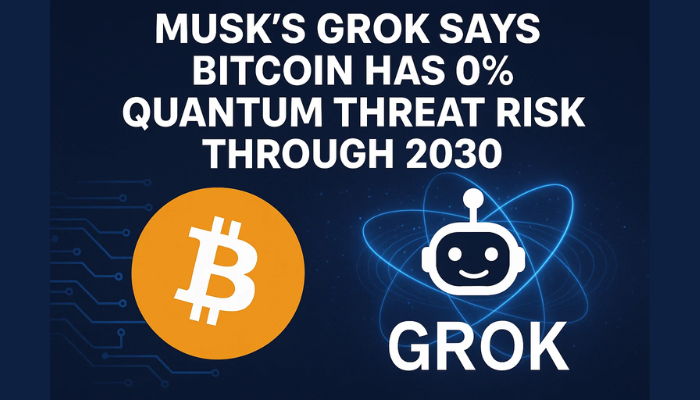Elon Musk reignited the debate on Bitcoin’s vulnerability to quantum computing after asking Grok—his X-owned AI assistant—whether emerging technologies could compromise the network’s cryptographic defenses. Grok’s verdict was reassuring: Bitcoin will likely remain impervious to quantum threats for at least the next decade.
The core of Bitcoin’s security lies in the SHA-256 hashing algorithm, which underpins both mining and transaction validation. Musk’s question followed renewed attention on IBM and Google’s progress in quantum research, particularly in error-correcting quantum systems.
According to Grok, the probability of a quantum system breaking SHA-256 by 2030 is nearly zero. Looking ahead to 2035, that figure rises but still remains below 10%—based on current innovation trends and research, including a 2025 NIST report and IBM’s roadmap.
Highlights from Grok’s Response:
- 0% probability of Bitcoin breach by 2030
- <10% risk of SHA-256 compromise by 2035
- Millions of logical qubits required to pose a real threat
- IBM’s Blue Jay system with 2,000 qubits expected by 2033
Despite Google’s earlier speculative claim involving its Willow quantum chip, Grok—and the broader consensus—suggest that real quantum threats remain at least 10–20 years away.
Developers Prepare for a Post-Quantum World
Though Grok’s assessment provided comfort for now, Bitcoin’s core developers are not resting. Preparations are already underway to future-proof the protocol against even the smallest risks.
Among the initiatives:
- Bitcoin Improvement Proposals (BIPs) exploring post-quantum algorithms
- Experimental work on quantum-resistant key exchange protocols
- Efforts to transition wallet technologies away from legacy cryptographic systems
Other blockchains are joining the effort. Ethereum developers, for example, recently rolled out a 10-year strategy aimed at quantum resilience while simultaneously boosting network efficiency.
Such moves reflect a growing awareness that while the risk today is theoretical, the cost of unpreparedness could be catastrophic if quantum capabilities suddenly leap forward.
Crypto Markets Recover After Brief Crash
The quantum conversation unfolded as crypto markets began recovering from a sharp dip. Bitcoin briefly slipped below $112,000, rattled by macroeconomic pressures and renewed regulatory fears. As of press time, Bitcoin trades at $113,974, while Ethereum holds above $3,500.
Despite near-term volatility, long-term sentiment appears anchored by reassurance that the integrity of Bitcoin’s cryptography remains secure, even in the face of one of tech’s most formidable frontiers—quantum computing.


